Top Medical Virtual Assistant Skills for 2025
04 Jul 2025 By: Vlade Legaspi
Updated

Great skills are vital for smooth healthcare work. These experts manage administrative tasks so providers can focus more on patient care. Knowing the key medical virtual assistant skills helps future assistants grow while allowing medical teams to work faster and more efficiently, especially when supported by a virtual medical assistant for healthcare practices that understands real-world clinical workflows.
Medical Virtual Assistant Skills: Understanding the Role of a Medical Virtual Assistant
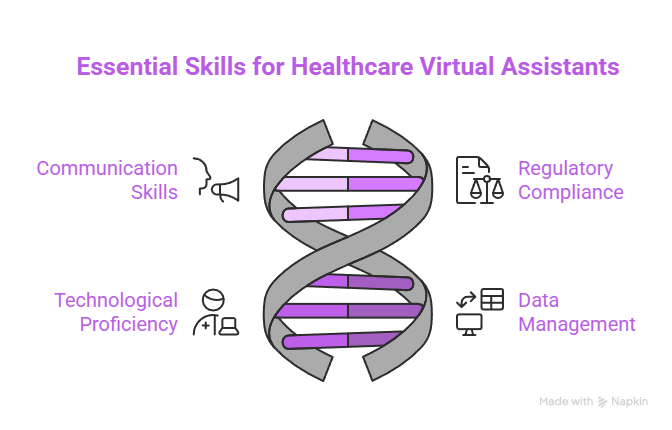
Healthcare virtual assistants work as professionals who offer administrative help to medical providers from a distance. Healthcare providers who work as virtual assistants perform multiple duties including patient record management as well as scheduling appointments and handling billing inquiries. Remote work flexibility benefits healthcare practices because it enables HVAs to provide support without requiring physical presence thus serving small practices or cost-conscious healthcare facilities. Through technology implementation HVAs optimize healthcare operations which results in better patient care.
The main duty of HVAs consists of connecting patients to healthcare providers while performing administrative work. Patient follow-up support and service information provision along with communication management form part of their duties. The healthcare environment requires professionals who blend diverse skills to succeed in this position. The healthcare field demands HVAs to maintain excellent communication abilities for patient information exchange and worry resolution while ensuring HIPAA compliance through their deep understanding of healthcare regulations.
The role of an HVA transforms alongside technological progress. Specialized software allows HVAs to handle telehealth services through virtual appointments and online patient communication without any issues. The healthcare provider gains improved patient satisfaction and expanded service reach to underserved regions through this adaptation. The increasing popularity of telemedicine will create a rising need for skilled HVAs who can handle digital platforms thus establishing a promising career path in healthcare.
The duties of HVAs extend to managing data systems while analyzing medical information. Their data organization skills allow healthcare providers to detect patterns and enhance both service quality and treatment results. The healthcare industry places greater importance on data-driven methods because providers need to deliver personalized care while making decisions based on patient requirements. The healthcare industry sees HVAs as valuable strategic partners who contribute to both administrative support and overall success of healthcare practices.
Essential Medical Virtual Assistant Skills
Strong Communication Skills
The healthcare industry depends fundamentally on effective communication. The primary requirement for healthcare virtual assistants is their ability to use both verbal and written communication to interact with patients and healthcare providers and other stakeholders. The ability to present complicated data in simple terms while being empathetic constitutes an essential requirement for HVAs.
The communication methods HVAs use include phone calls together with emails and messaging platforms. The need to adapt communication approaches according to different recipient groups stands as a critical requirement. When healthcare providers explain medical terms to patients in simple terms the patient satisfaction and treatment compliance rates increase significantly. The ability to listen attentively stands as an essential component of communication practice. When HVAs demonstrate the ability to listen to patient concerns they create trust while making patients feel heard and valued in the process. The practice results in improved patient outcomes because people tend to execute treatment plans better when they understand what is happening.
Proficiency in Medical Terminology
Knowledge of medical terminology serves as an essential requirement for HVAs. Medical staff can trust the accuracy of patient information documentation because HVAs understand healthcare providers’ instructions and communicate effectively with medical staff. The comprehension of medical terminology requires particular focus on diagnostic and therapeutic terms and procedural language.
HVA professionals might perform billing-related coding work that demands knowledge of specific codes alongside relevant regulations. Medical terminology training through continuous education helps HVAs maintain both their expertise and job competence. Training activities that include workshops or sessions provide HVAs with access to medical field developments thus allowing them to learn the current language and practices. The continued education of HVAs results in better medical skills and increased confidence for handling complex medical topics which benefits healthcare professionals and their patient population.
Organizational Skills
The fast-paced nature of healthcare environments requires virtual assistants to have strong organizational abilities. Healthcare virtual assistants need to perform several tasks at once which includes appointment scheduling and patient record management alongside communication coordination. A virtual assistant must properly manage their time and establish priorities to complete tasks effectively.
The use of organizational tools along with software helps people work more productively. Users can schedule appointments through calendar applications but project management tools help them track ongoing tasks and deadlines. A healthcare practice benefits from substantial improvements to its workflow when it has an efficient virtual assistant. Electronic health record (EHR) management through systematic methods enables quick patient information access which supports efficient care delivery and faster responses to inquiries. By establishing systematic documentation protocols and data management procedures HVAs can help reduce errors while creating a unified healthcare experience for providers and patients. Tools like MagicHow is an intuitive SOP software can support this process by standardizing workflows, reducing training time, and improving task handoffs across healthcare teams.
Technical Proficiency
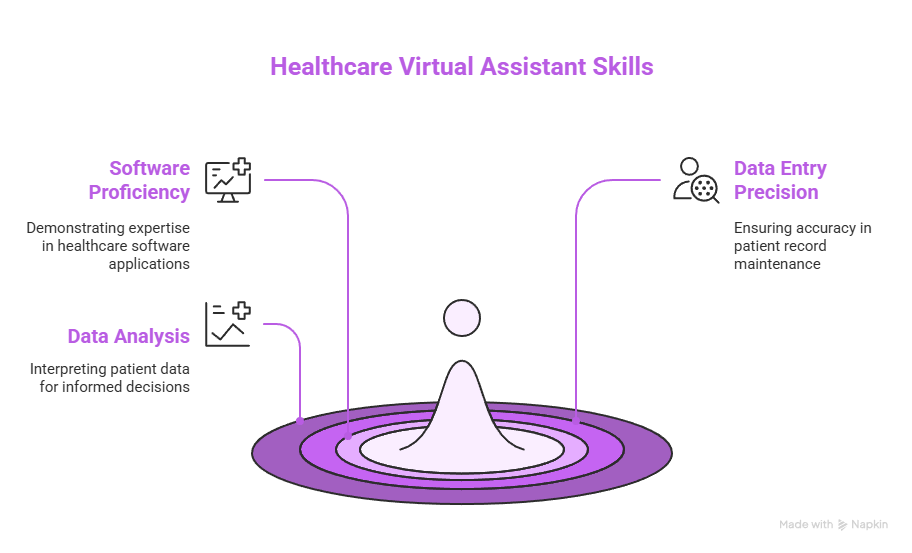
Familiarity with Healthcare Software
Healthcare virtual assistants need to demonstrate proficiency in operating different healthcare software applications. The healthcare industry relies on three main software systems which include Electronic health records (EHR) systems and practice management software and billing platforms. The knowledge of these tools enables both administrative efficiency and healthcare regulatory compliance.
The training for specific software applications becomes essential because different healthcare facilities operate with different systems. Healthcare virtual assistants need to demonstrate adaptability along with learning new technologies to maintain their effectiveness in their positions.
Data Entry and Management Skills
Healthcare virtual assistants must perform data entry tasks with absolute precision. The accurate maintenance of patient records by HVAs remains essential because any errors can result in severe consequences for patient care. The role requires absolute attention to detail for this specific responsibility.
The ability to analyze and report on patient data should be part of the data management skills that HVAs possess. This skill can be used by health care providers to assist them in coming to decisions by analyzing patient trends and the indigent outcomes.
Interpersonal Skills
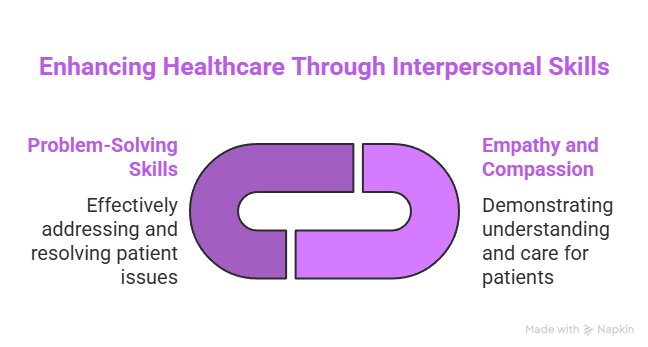
Empathy and Compassion
Healthcare workers have to show empathy and compassion as part of their daily activities. Virtual aids, on the other hand, have to go out of their way to support patients whose interactions with the health system are a source of stress and anxiety due to health issues. The patient experience improves significantly when staff members show sensitivity during their interactions.
The goal of HVAs should be to establish a supportive environment which makes patients feel heard and valued. The process of active listening to patient concerns together with providing reassurance when needed constitutes a key aspect of this approach. Empathy leads to patient satisfaction and positive connections between patient and healthcare provider.
Problem-Solving Skills
Healthcare virtual assistants need to solve various problems through their ability to think quickly and effectively. The responsibilities of HVAs include scheduling management and billing support and patient issue resolution which demands their ability to evaluate situations and create suitable solutions.
The development of strong problem-solving abilities requires both critical thinking and creative thinking skills. The healthcare environment benefits from HVAs who learn to generate innovative solutions for resolving problems efficiently. The ability to adapt proves essential for success in the constantly changing healthcare sector.
Knowledge of Healthcare Regulations
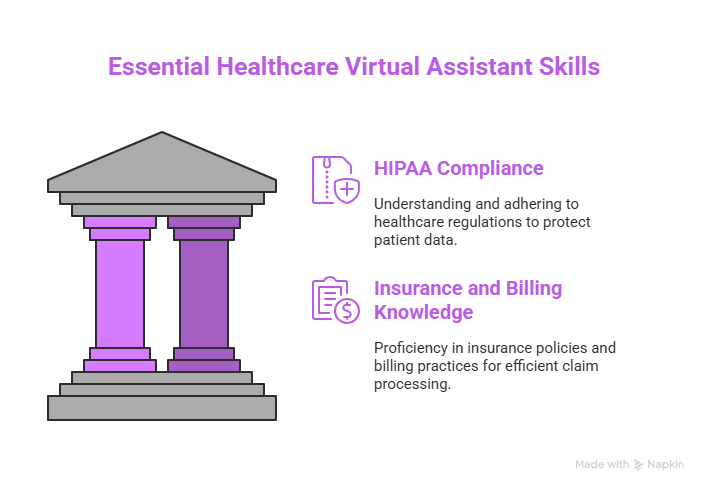
HIPAA Compliance
Healthcare virtual assistants need to understand healthcare regulations especially the Health Insurance Portability and Accountability Act (HIPAA). The Health Insurance Portability and Accountability Act (HIPAA) establishes standards for protecting patient information so HVAs need to handle sensitive data properly.
The training about HIPAA compliance stands as a vital requirement because healthcare providers face major penalties and patient trust breakdowns from noncompliance. The protection of patient information requires HVAs to demonstrate expertise in established best practices for confidentiality maintenance and data security.
Insurance and Billing Knowledge
The insurance verification and billing procedures receive assistance from HVAs. The processing of claims requires HVAs to understand insurance policies together with coding and billing practices to achieve accurate and efficient results. The knowledge enables healthcare practices to reduce payment delays which leads to better cash flow management.
HVAs need to understand typical billing problems together with their corresponding solutions. Taking initiative allows patients and healthcare practitioners to save time and diminish their levels of hostility.
Adaptability and Continuous Learning
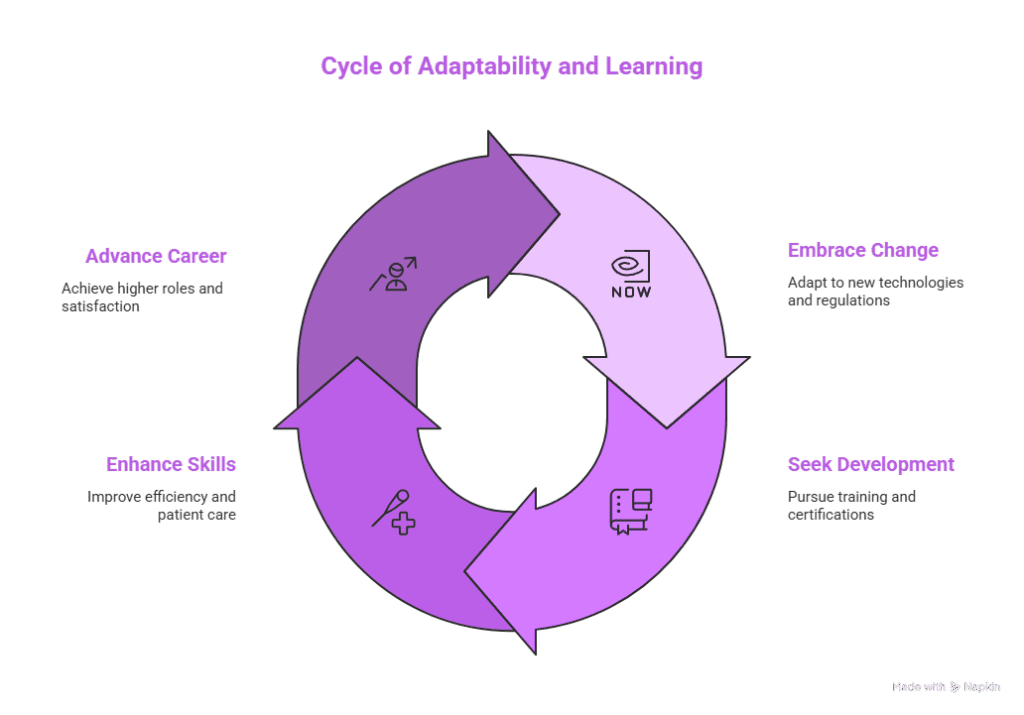
Embracing Change
The healthcare industry experiences continuous transformation because new technologies and regulations and practices appear frequently. Healthcare virtual assistant skills is needed to demonstrate flexibility together with receptiveness toward changes in their work environment. Their ability to adapt helps them maintain their position as effective and relevant professionals.
Healthcare virtual assistants who welcome new tools and methodologies achieve better efficiency while delivering superior patient care. Virtual assistants in healthcare should not stop looking for professional development opportunities and training programs that will help them maintain their skills at the current level.
Commitment to Lifelong Learning
To be effective, the qualities of a healthcare virtual assistant need to be very flexible and fully committed to their ongoing professional development. Virtual healthcare assistants need to do all the above, which include getting certified, attending workshops, and taking courses, as well as knowing about medical administration, terminology, and technology to boost their professional development.
Continuous learning is a process through which Healthcare Virtual Assistants (HVAs) acquire new and advanced skills and at the same time prove their commitment to professional development. The commitment to lifelong learning not only advances one’s career but also increases the level of job satisfaction one experiences. satisfaction levels.
TRENDING NOW!
The implementation of virtual medical assistants (VMAs) provides multiple valuable capabilities that support active healthcare facilities. The essential characteristics of VMAs include self-motivation, strong organisational skills, and the ability to work effectively as part of a remote team. Their support reduces the workload of in-house staff while maintaining high-quality service delivery. For practices looking to scale support efficiently, many choose to hire a virtual medical assistant who can manage administrative responsibilities without adding operational strain.
VMAs demonstrate strong adaptability by transitioning smoothly between data entry, phone support, and patient billing tasks. Their technical skills, attention to detail, and understanding of medical terminology and HIPAA guidelines help ensure accurate documentation and secure data handling. Modern medical offices also benefit from their ability to provide off-hours support and cover staff gaps, making them a flexible and reliable option.
Conclusion
A healthcare virtual assistant performs multiple responsibilities which need various competencies. Healthcare virtual assistants deliver essential support to healthcare providers and improve patient care through their strong communication skills and organizational abilities and technical proficiency and interpersonal skills.
The increasing need for healthcare virtual assistance requires individuals to concentrate on building fundamental competencies for this field. Healthcare organizations will recognize their value through this approach which leads to better patient results and operational effectiveness.
The constantly evolving healthcare setting deems the virtual assistants for the healthcare sector as a necessity in the provision of quality care. Their skills to change, learn, and offer kind support make it impossible for them to be excluded from the quality healthcare delivery.
HelpSquad health is ready to help. Our trained virtual assistants and 24/7 support team handle healthcare tasks with ease. With bilingual agents from $9/hr. you get expert help without high costs. Start your trial now and see the HelpSquad difference!
FAQ’s
What skills are needed for a medical assistant (especially a medical virtual assistant)?
The biggest needs are clear communication, medical terminology, organization/time management, technical proficiency (EHRs, scheduling, telehealth tools), accurate data entry, empathy, problem-solving, and knowledge of healthcare rules like HIPAA. HelpSquad
What are the most important qualities of a medical assistant in a patient-facing role?
The article highlights empathy and compassion, strong listening skills, professionalism, and the ability to explain information in a calm, patient-friendly way, especially when patients are stressed or anxious. HelpSquad
What medical assistant qualifications and skills do employers typically expect for virtual roles?
Common expectations include familiarity with medical terminology, confidence using EHR/practice management systems, solid written and verbal communication, reliable data handling, and understanding privacy and compliance (HIPAA). Some roles may prefer formal training or certifications, but the day-to-day “must-haves” are the skills above. HelpSquad
Can you share medical assistant skills examples I can put on a resume?
Examples aligned with the post include:
– “Managed appointment scheduling and patient follow-ups across multiple calendars”
– “Accurately updated patient records in EHR systems; maintained data quality”
– “Handled insurance verification and billing inquiries with attention to detail”
– “Provided empathetic patient communication via phone, email, and secure messaging” HelpSquad
What technical skills are required for medical assistant work done remotely?
Expect to use EHR systems, practice management software, billing platforms, telehealth tools, and secure communication apps. You’ll also need to switch between systems efficiently while keeping documentation accurate. HelpSquad
Why is medical terminology so important for medical assistants and medical virtual assistants?
Medical terminology helps you understand provider instructions, document correctly, and communicate clearly with clinical staff, and it can also matter for billing/coding accuracy and avoiding mistakes. HelpSquad
What skills required for medical assistant roles help prevent errors in patient records?
The biggest error-reducers are attention to detail, strong data entry and management, and consistent organizational systems (processes for documentation, tracking tasks, and keeping records easy to retrieve). HelpSquad
How does HIPAA compliance affect day-to-day medical assistant work?
It means treating patient information as sensitive at all times, using secure tools, sharing info only when appropriate, and following privacy practices that protect confidentiality (especially in remote workflows). HelpSquad
What are the sources of the information shared in this HelpSquad blog post?
The post is written by a HelpSquad team member (Vlade Legaspi) and is presented as practical guidance about the role and skills of healthcare virtual assistants, including references to healthcare compliance concepts like HIPAA. The page also shows it was updated on November 20, 2025, which signals the content has been reviewed more recently. HelpSquad
Why is knowledge of medical terminology essential for healthcare virtual assistants?
Medical terminology helps virtual assistants understand provider instructions, accurately document patient information, and communicate clearly with clinical staff. It is crucial for billing and coding to avoid errors, rejected claims, and risks to patient care.
How do organizational and data management skills help medical virtual assistants support providers?
Strong organizational skills allow medical virtual assistants to manage multiple tasks like scheduling, follow-ups, and messages efficiently. Data management using EHRs, calendars, and SOP software ensures accurate records, identifies patient data trends, and minimizes errors for smooth healthcare workflows.
What are the skills of the medical virtual assistant that are the most significant?
Core skills include strong written and verbal communication, medical terminology knowledge, organization and time management, computer proficiency with EHRs and practice software, accurate and fast data entry, empathy and patience with patients, problem-solving, and knowledge of healthcare regulations like HIPAA.
What does a medical virtual assistant do?
A medical virtual assistant provides remote administrative support to healthcare providers, including managing patient records, scheduling appointments, handling billing and insurance inquiries, supporting telehealth visits, following up with patients, and managing communication among patients, doctors, labs, and staff.
What tech skills do virtual assistants in healthcare need?
Healthcare virtual assistants need proficiency with practice management and billing software, EHR systems, telehealth platforms, and secure messaging applications. They must enter data quickly and accurately, switch between multiple systems, and adapt to new tools as healthcare practices upgrade their technology stack.


